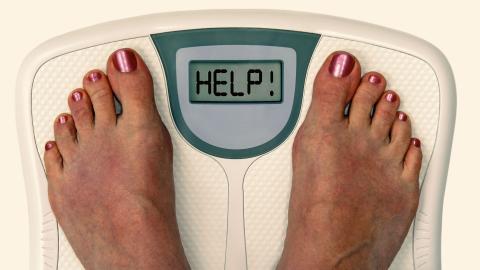
7 Tips to Avoid Gaining Holiday Weight
Research shows the average American gains three to five pounds between Thanksgiving and New Year's Day. Although many people plan to lose that extra weight in the new year, too often that doesn't happen. That means after many years, a few extra pounds over the holidays adds up to what can be a serious weight problem, leading to a number of health issues including diabetes, cancer, and heart disease.
Adrienne Youdim, M.D. an internist who specializes in medical weight loss and nutrition and author of the bestseller Hungry for More: Stories and Science to Inspire Weight Loss from the Inside Out told CBN News we can avoid packing on extra holiday pounds while still enjoying goodies in moderation by using seven common-sense strategies.
***Please sign up for CBN Newsletters and download the CBN News app to ensure you keep receiving the latest news from a distinctly Christian perspective.***
1. EAT PROTEIN: Eating plenty of protein like fish, beans or chicken makes us less likely to overeat sweets. "Protein is the macronutrient that curbs hunger most," she said.
2. FILL HALF YOU PLATE WITH FRESH VEGGIES: These foods are low in calories, are very filling, and are loaded with nutrients. "I personally love arugula," said Dr. Youdim, "I eat it every day. And one cup of arugula is two to five calories but has 30 vitamins, minerals, and antioxidants."
3. CHOOSE SPARKLING WATER INSTEAD OF ALCOHOL: Alcohol has "empty calories," which means the beverages are loaded with calories with little to no nutrition. "Alcohol actually intercepts some of our hunger hormones," Dr. Youdim explains, "Leptin is a hormone that's released by the fat cell that tells our brain that we are full, and alcohol actually intercepts that hormone."
4. DRINK A CUP OF HOT TEA AFTER A MEAL: Hot beverages, preferably decaffeinated herbal tea, help put the brakes on further eating. "It takes time for our stomach, or our gut, to receive food," said Dr. Youdim, "A warm drink sends a signal to the brain notifying that the food has been received and those hunger hormones, or signals, should be shut off."
5. GET ENOUGH SLEEP: Research shows people who don't get enough sleep are more prone to overeat unhealthy foods. "They've also done studies where in just two nights they've noticed that hunger hormones go up by about 30 percent and when they surveyed these individuals, they craved highly palatable, or yummy foods," said Dr. Youdim. "So when people are sleep deprived they're more likely to go for doughnuts and for fries. You don't crave broccoli when you're sleep-deprived."
6. EAT SENSIBLY BEFORE THE PARTY: Dr. Youdim says "saving calories" tends to backfire. People who are planning to attend a special dinner or party where the food will be fantastic may nearly starve themselves before the event, which can be a mistake. "That in and of itself can result in consuming way more calories than you otherwise would eat," she said, recommending instead to drink a protein shake on your way out the door.
7. DON'T EAT YOUR FEELINGS: Stop using food to feel better emotionally, because when emotions run high, we tend to overeat. "What are we really hungry for, right? We tend to use food to soothe many, many emotions, not just sadness, but often boredom," said Dr. Youdim, who recommends learning to cope with our emotions by using creative outlets, exercise, and connecting with others.
MORE: 5 Tips to Help You Feel Your Best with Less Holiday Stress




